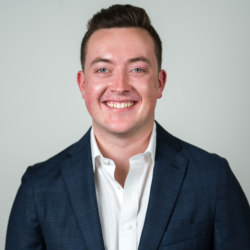What Would Howard Do?
The “WWHD Conference — What Would Howard Ahmanson, Sr., Do?” — was held August 1, 2018, the year marking the 50th anniversary of my father’s death. I decided I wanted to sponsor it, mostly to honor him.
In the tumultuous year of 1968, when Howard Sr. died, he owned Home Savings and Loan, the largest savings and loan company in America. It was later renamed ‘Home Savings of America’.
This took place in a time during which the distinction between a ‘Savings and Loan’ and an ordinary bank was more tightly defined than it is today. In 1968, savings and loans lent only on real estate and paid slightly higher rates than banks to their depositors.
In those days, my dad made loans to many people – loans that would enable them to buy their own single-family homes in Southern California. When he died, the branches of Home Savings were confined to four Southern California counties. Later on, the company went nationwide. And finally, in 1998, the leadership of Home Savings sold the company to Washington Mutual, who ran it into the ground.
Subsequently, in the Crash of 2008, the remnants of Washington Mutual and Home Savings of America were swept up by Chase.
One indisputable fact is that a large number of the people to whom my father loaned money for home purchases would not be able to buy homes today.
That reality is what inspired the WWHD conference.
Our speakers explored Howard Sr’s legacy and tried to explain the changes in financing, both in society and in law, making housing out of reach for the very sort of people who were once Howard, Sr.’s primary customers.
I discovered, in a survey from the UCLA Luskin School, that “Los Angeles is now the metro area with the highest share of renters in the country at 52%.” This fact is far removed from what Home Savings of America, and the other great savings and loans of the day, were trying to achieve.
As the Irish would say, “if my dad were alive he would turn over in his grave!”
I wanted to know what changed – another reason for the conference. We have to consider our history. As my friend John Perkins has often said, “We have to remember the past and give it dignity.” I hope the conference made that possible. Meanwhile, a few facts about my father’s history might be interesting.
Howard Sr. earned a Bachelor of Science degree in Economics in 1927, which I would argue is quite the equal of any MBA today. I would also like to claim he was named after me but chronologically, given that he was born in 1906, it seems unlikely.
In his time, Howard Ahmanson, Sr., was known as an innovative business thinker. Five years after he died, Home Savings was struggling with issues about going public and was dealing with the inflationary and unsettled environment of the day.
At that point, a writer at Forbes Magazine, in an article called, coincidentally, “What Would Howard Do?” charged that the management of H. F. Ahmanson and Company, the holding company of Home Savings, was trying to manage by holding seances and channeling him. Desperate times demand desperate measures! However, despite the troubles of the time, things were probably not that desperate. Still, it’s quite true that my father was unique in his foresight and intuitive skills.
For example, in 1927, a foreclosure was sufficient to void any fire insurance, because it was believed that arsonists would target foreclosed houses. Dad reasoned that lenders might actually have an incentive to be good stewards of foreclosed property. So he decided to specialize in the business of fire insurance for houses in foreclosure. And starting in 1929 there were suddenly a lot more of them!
Similarly, Dad thought that fire insurance companies of the time were overcharging residential customers and making discount deals with commercial clients. So he decided to focus exclusively on residential business and to offer cheaper fire insurance to homeowners.
I didn’t inherit my father’s business talents, but I do think, by taking an interest in this issue, I may in some way have proved to be his son after all.
Personally, if he’d lived to see today’s financing disarray, I think he’d say, “Screw it!” and go back into the insurance companies. Insurance, by the way, had been his work for twenty years, before World War II. In any case, that’s what I might do if I were in his position. Perhaps it is impossible to run a savings and loan to a broad-based public anymore.
It’s also quite possible that he might come up with some ingenious solution that no one else has ever thought about. These days, we call it ‘thinking outside the box’. That’s exactly what Howard F. Ahmanson, Sr., did.
At the WWHD conference, some of our speakers, who know the history of Los Angeles well, told us just how far that statistic is from how Los Angeles was conceived 100 years ago. A prognosticator would just as soon expect L.A. to become a city of long snowy winters. In fact, Neil Diamond sang in an old song about L.A., “Palm trees grow, rents are low, and the feeling is laid back!” Clearly, it is a very old song!
In the meantime, my main goal with the WWHD conference was to examine how we got from that long-ago world to where we are today.
The deepest takeaway for me was from William Fischel of Dartmouth. He has written Zoning Rules!, The Homevoter Hypothesis, and Regulatory Takings. These writings trace the history of the revolution in attitudes toward land use that has taken place in the last hundred years.
